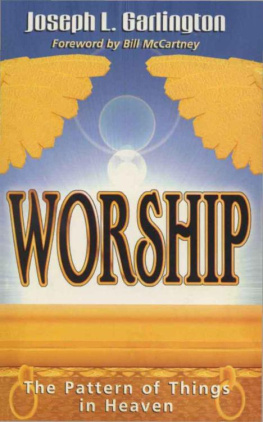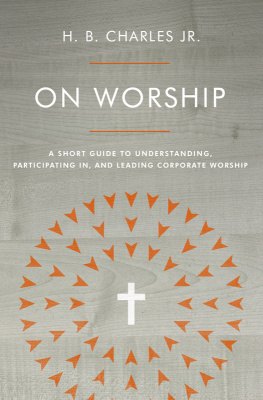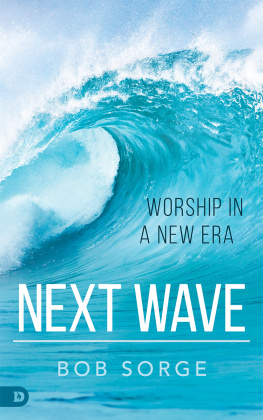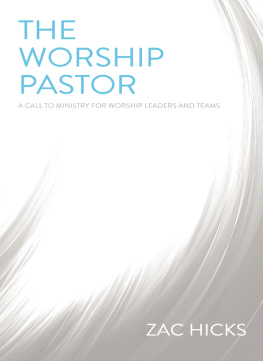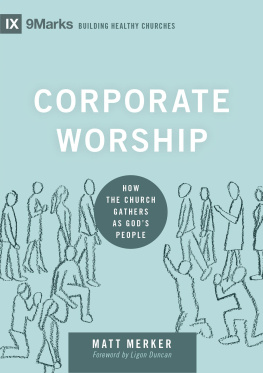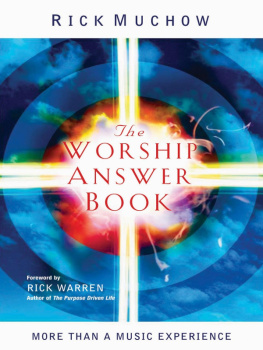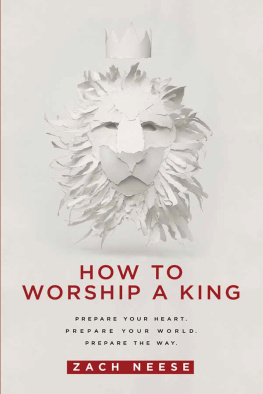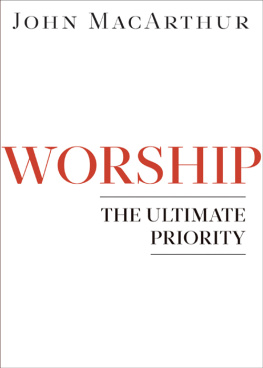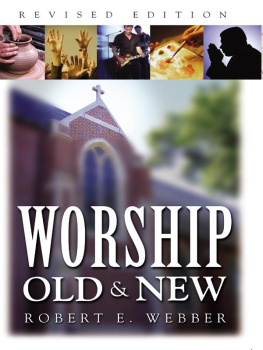Dedication
When I call to remembrance the unfeigned faith that is in thee, which dwelt first in thy grandmother Lois, and thy mother Eunice; and I am persuaded that in thee also (2 Timothy 1:5 KJV).
I dedicate this book to my mother, Valdese Garlington more widely known as " Muttie ." She has been my mentor, teacher, and model for worship all my life. Thanks, Mom!
Contents
Part I
Part II
Part III
Part IV
Foreword
"A promise keeper is committed to honor Jesus Christ through worship, prayer, and obedience to His Word in the power of the Holy Spirit."
As Promise Number One of the Seven Promises of a Promise Keeper indicates, we believe worship is one of the primary disciplines of the Christian life, and, as anyone who's been to a PK conference knows, worship is central to what we do. Our stadium events begin with, are punctuated by, and end with "psalms, hymns, and spiritual songs." For many men, it represents the first time they have experienced the true joy of "singing and making melody in their hearts to the Lord" (see Eph. 5:19). It's a worship experience that often ushers them into the very presence of Almighty God. Guys who haven't cried for years (or ever!) find themselves weeping as their hearts overflow with a holy desire to love and obey God more.
True worship is not just an emotional experience. It reaches to the very depths of our souls and touches every aspect of our being. While it can generate powerful feelings, it also can enlighten our minds, expanding our perspective and understanding of God. It can convict us of sin and lead us to repent; it can confirm a Scripture or specific word the Lord may have spoken to us and encourage us to obey; and it can change our hearts and inspire us to reach for new heights of holiness. Such is the power of the sincere praise and adoration of our heavenly Fatherand that just what it does for us!
The truly miraculous thing about worship is that in some mysterious way, it also has the power to move the heart of God. It may just be impossible for us to touch Him without it. As the psalmist admonishes, "Worship the Lord with gladness; come before Him with joyful songs. Enter his gates with thanksgiving and his courts with praise; give thanks to Him and praise His name" (Ps. 100: 2 ,4 NIV). In a very real sense, the Almighty receives us on the basis of our worship and thanksgiving. It's our "passage way" into the very throne room of God. As with prayer, the Lord responds to our worship. As we draw near to Him in song, He draws near to us. And as we minister to Him in worship, He ministers to us. As we express faith in Him through praise, He blesses us.
I know few men who understand these things better or who know how to worship God in "spirit and truth" more than Joseph L. Garlington . As a worship leader for Promise Keepers' conferences, Joseph has led hundreds of thousands of men in worshiping the Lord. Whether it's an unusual sensitivity to the Spirit of God or a rare gift, time after time, we've noticed that something special takes place as Joseph directs men in praise to our God. I've seen huge arenas with guys united in joyful (or solemn) worship as he leads them. In response to a call from Joseph, I've also witnessed thousands of men flood a stadium floor, singing from their hearts, lingering in God's Presence and content to go on worshiping indefinitely. That's the effect a godly worship leader can bring to a gathering, whether it's 50,000 men in a football stadium or a home Bible study with just a few people.
I believe Joseph's book, Worship: The Pattern of Things in Heaven, offers a wealth of insights on the nature of worship to anyone who reads it. As you consider the perspectives of a man who has become one of the preeminent praise leaders of our time, I pray you'll be encouraged to pursue God with fresh passion and an undivided heart, and that they will inspire in you a holy desire to reach for a deeper level in your worship of our Lord and Savior, Jesus Christ. All glory to His name, now and forever more!
Bill McCartney Founder and CEO of Promise Keepers
Introduction
I can't remember a time when music was not a part of my life. My mother, who is still the most passionate worshiper I know, always has been a lover of music. She is an accomplished musician and composer who has trained many choirs and small groups. All of them, it seems, used to come to our tiny apartment in the Willert Park Housing Project in Buffalo, New York, and rehearse. The saying goes, "It's better caught than taught." Whatever she had then, I have now.
I can remember how much music could console my disappointment and keep me entertained when I was alone. When the disciples asked Jesus for an example of a true Kingdom person, He placed before them a child. I don't believe that genuine worship, such that pleases the Father, is possible without "becoming" childlike. When I observe the "little worshipers" in our church and in my family, the attribute that is most apparent to me is the absence of self-consciousness. Children don't become self-conscious until they realize someone is watching them.
"Whatever you do, do heartily as unto the Lord," the apostle Paul told the Colossians (see Col. 3:23). The model worshiper for me is David. I identify with him in so many ways. And, some of the most powerful pictures of his worship are at the two extremes of celebration on the one hand and great loss on the other. David's description of a sacrifice offered to God is capsulated in his declaration to Araunah the Gibeonite . "However, the king said to Araunah , 'No, but I will surely buy it from you for a price, for I will not offer burnt offerings to the Lord my God which cost me nothing' " (2 Sam. 24:24). I am convinced that, eventually, true worship will "cost" you something. It will cost you your dignity or your self-respect or some other thing we cherish usually in the sight of others. My suspicion is that we cloak our pride or embarrassment in the kind of words I've heard since I was a child: "It doesn't take all of that to please God." But David was different. His attitude seemed to be: "whatever it takes."
Jesus told the Samaritan woman that "the Father seeks" true worshipers. This makes David's passion all the more appealing to me because the prophet Samuel told King Saul, "The Lord has sought out for Himself a man after His own heart" (1 Sam. 13:14). It would be simpler to "find" the Father, if we only would worship.
"Unless you become like a little child," Jesus said. I have learned that "becoming" is a process, and that is especially true of becoming a worshiper. That "becoming" process will be the same for you and me as it was for King David. What it eventually will mean is that the more mature I become in worship, the more childlike I will be in the presence of the Ancient of Days. In fact, David told his wife Michal that he would continue to "play before the Lord." His own sense of identity is insignificant compared to his regard for his Creator. I want to be just like that.
"We had fun in church today!" These were the words of an eight-year-old expressing her delight for an incredible time of worship that touched every generation. A friend of mine in our city who pastors a mainline denominational church visited our services one summer. He told me later that his son said, "Dad, this is a fun church. Why don't we come here on Sundays?" Covenant Church of Pittsburgh has a purpose statement that attempts to capture our reason for existence. A portion reads: "Covenant Church of Pittsburgh exists to glorify God through a proper response to the Lordship of Jesus Christ; to express that response through wholehearted obedience to the scriptures, powerful worship.... "
Our church is involved in many endeavors in our city. We are reaching out to the community in many different ways, and our burden over the years is to be a credible model of the message of reconciliation. If you were to ask the average person in our region what we are known for, however, the response you would invariably hear is "the worship." There are two phrases from the movie The Field of Dreams that have impacted me in my approach to church growth. The first is the most quoted one: "If you build it, he will come." The second is at the end of the movie after he has built it, and it seems to be in vain. His little daughter says, "People will come."

